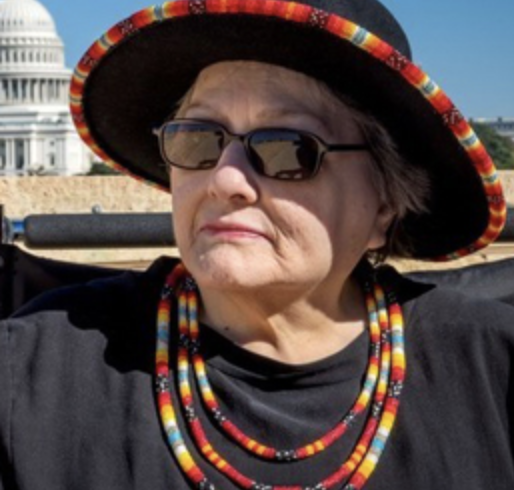Longtime Native American journalist and advocate Suzan Shown Harjo (Cheyenne & Hodulgee Muscogee) has been selected to be inducted into the Oklahoma Journalism Hall of Fame. The induction ceremony will be held on Thursday, May 2, 2024 at the Nigh University Center at the University of Central Oklahoma.

Born in El Reno, Oklahoma, Harjo began her illustrious journalism career in 1967 in New York City at WBAI-FM, Pacifica Network’s free speech flagship, where she directed one-third of the airtime and co-produced Seeing Red, the first national Native American issues show until 1974.
Harjo moved to Washington, D.C. where she was news director of the American Indian Press Association. Soon she drew the attention of the Carter White House and was selected to serve as Congressional liaison for Indian affairs during the Carter administration.
From February 1984 to November 1989, Harjo served as the executive director of the National Congress of American Indians (NCAI), the largest national organization serving Indian Country. During this time, she worked hard to bring the issue of repatriation to the attention of members of Congress.
Widely published and anthologized, she has written for all versions of Indian Country Today and served on boards from Native American Journalists Association to Howard Simons Fund for American Indian Journalists.
A Founding Trustee, Smithsonian’s National Museum of the American Indian, she was Editor/Curator, “Nation by Nation” (Treaties) book and exhibition (2014-27).
Currently, Harjo serves as the president of The Morning Star Institute, a national Native American rights organization. For decades, she has worked on getting sports teams to drop names that promote negative stereotypes of Native Americans.
She holds Honorary Doctorates from the Institute on American Indian Arts, 2011, and Princeton University, 2023, and
Among her many awards, Harjo received the Presidential Medal of Freedom in 2014 from President Barack Obama.
More Stories Like This
Native News Weekly (August 25, 2024): D.C. BriefsNavajo Nation Mourns the Passing of Former Vice President Rex Lee Jim
Deb Haaland Earns Endorsement From Communications Workers of America Local 7076
University Soccer Standout Leads by Example
Two Native Americans Named to Democratic Congressional Campaign Committee's“Red to Blue” Program
Help us defend tribal sovereignty.
At Native News Online, our mission is rooted in telling the stories that strengthen sovereignty and uplift Indigenous voices — not just at year’s end, but every single day.
Because of your generosity last year, we were able to keep our reporters on the ground in tribal communities, at national gatherings and in the halls of Congress — covering the issues that matter most to Indian Country: sovereignty, culture, education, health and economic opportunity.
That support sustained us through a tough year in 2025. Now, as we look to the year ahead, we need your help right now to ensure warrior journalism remains strong — reporting that defends tribal sovereignty, amplifies Native truth, and holds power accountable.
 The stakes couldn't be higher. Your support keeps Native voices heard, Native stories told and Native sovereignty defended.
The stakes couldn't be higher. Your support keeps Native voices heard, Native stories told and Native sovereignty defended.
Stand with Warrior Journalism today.
Levi Rickert (Potawatomi), Editor & Publisher


